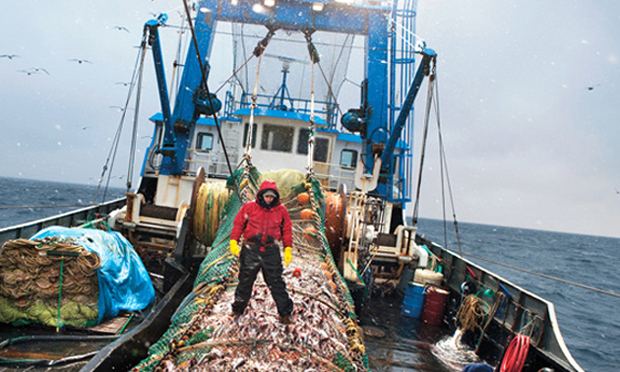The dangers for the world’s seas and oceans are many — from climate change and warming waters to overfishing related to the needs of growing world populations. As a major 2015 paper in the journal Science noted, extinction of many species is a looming reality, given the current decline in quality of aquatic ecosystems. The perils for large marine mammals, sharks and other large fish are well known to the public. But there are many other dangers. For example, the rapid rate of ocean acidification, which appears to be unprecedented in Earth’s history, threatens to decimate shellfish populations.
Of course, debates about overfishing and sustainable management practices rage in virtually every fishery across the world. These policy debates are seldom simple to resolve and involve complex tradeoffs: Traditional fishing rights versus government regulation; short-term profits versus longer-term sustainable growth; local population food needs versus larger ecological and stewardship concerns. Organizations such as the U.S. National Oceanic and Atmospheric Administration (NOAA) and the Food and Agriculture Organization (FAO) of the United Nations keep statistics on the state of fisheries and their relative health. The FAO’s annual The State of World Fisheries and Aquaculture provides a comprehensive overview. For U.S. reporters and editors covering these issues on the nation’s coasts, it is worth getting to know some of the long and complex policy and regulatory history in this area, which for nearly four decades has been governed by the Magnuson-Stevens Fishery Conservation and Management Act.
As marine science evolves and the available data get more precise, researchers are able to make more definitive estimates about how exactly ocean resources should be managed over the coming decades. It is also the case that relying more on sophisticated economic analysis can help provide a better basis on which to resolve difficult conflicts and competing values. A 2016 study, “Global Fishery Prospects under Contrasting Management Regimes,” published in Proceedings of the National Academy of Sciences (PNAS) provides one of the most comprehensive analyses to date of various policy options. The study analyzes current data and makes forecasts out to the year 2050 to explore what the world’s fishing resources could look like if alternative methods for management were implemented. A dozen researchers from three institutions — the Bren School of Environmental Science and Management, University of California, Santa Barbara; the Environmental Defense Fund; and the School of Aquatic and Fishery Sciences, University of Washington — produced a comprehensive database of 4,713 fisheries globally, representing 78 percent of the world’s fishing grounds. Taking into account the current state of health of the fisheries, the relative profits and other relevant factors, the scholars model how different management practices would affect health, sustainability, capacity and commercial potential over the long run.
The researchers compare three scenarios: 1) business-as-usual management; 2) fishing to maximize long-term catch; 3) rights-based fishery management (RBFM), where economic value is optimized. The three main variables of interest considered in the analysis were: profit; catch size; and total biomass of fish in the sea.
The concept of rights-based management is complicated and multi-dimensional, but for the purposes of this study it is defined as the “harvest trajectory that maximizes the net present value (NPV) of profit in the fishery over a long time horizon”; and it assumes that “recovery is ‘optimal’ from an investment perspective – no other harvest path can achieve higher NPV of that fishery.” Under rights-based scenarios, “catches are specifically chosen to maximize the long-term sustainable economic value of the fishery.” This approach, the scholars note, “has been shown to increase product prices (primarily due to increased quality and market timing) and reduce fishing costs (primarily due to a reduced race to fish).”
The study’s findings include:
- Most fisheries worldwide are facing substantial problems: “The median fishery is in poor health (overfished, with further overfishing occurring), although 32 percent of fisheries are in good biological, although not necessarily economic, condition.”
- If new management practices are not implemented, the coming decades will see massive, negative and perhaps sudden change in the world’s productive waters, particularly among fisheries that are already on the brink. The “business-as-usual scenario projects further divergence and continued collapse for many of the world’s fisheries.”
- If rights-based management practices to maximize economic value were implemented, the global benefit would be enormous over the next few decades, compared to business-as-usual scenarios. Global maximum sustainable yield would increase to 98 million metric tons (MMT), “substantially larger than the 80 MMT reportedly caught across the globe in recent years.”
- Global fishery profits could increase by 64 percent. “Applying sound management reforms to global fisheries in our dataset could generate annual increases exceeding 16 million metric tons (MMT) in catch, $53 billion in profit, and 619 MMT in biomass relative to business as usual.”
Overall, the researchers find, “if reform efforts are put in place now, the median time to recovery would be just 10 [years], and by midcentury, the vast majority (98 percent) of stocks could be biologically healthy and in a strong position to supply the food and livelihoods on which the world will increasingly rely.”
Related research: A 2015 research review that appeared in the journal Science, “Marine Defaunation: Animal Loss in the Global Ocean,” looks at the oceanic impacts of global warming.
Keywords: overfished, sustainable fishing, marine life, fisheries reform, fisheries management, fishery recovery, fish biomass


Expert Commentary